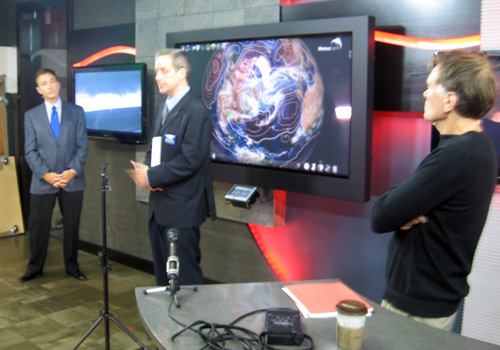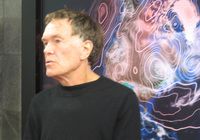
What made “tornado alley” move 500 miles north — to Minnesota — this summer? Why have there been two major floods in Iowa in recent years, and annual flooding in the Red River Valley of Minnesota?
A report issued today by Environment Minnesota, an environmental advocacy organization, stops short of definitively saying the disasters are attributable to global warming, but said “extreme weather” is likely the result of a warming planet (See the report).
“This is not a coincidence,” meteorologist Paul Douglas (left above) said. “We’ve had an accumulation of coincidences. I tell people, ‘strip out the ideology. Look at the numbers. Look at the science.’ This has been an amazing year.” ()
Douglas acknowledges that one year does not a trend make, “but we’ve had 384 consecutive months where the global temperature has been warmer than the 20th century average. Now I’m all for serendipity, but at some point you step back, you connect the dots, you look at the pieces of the puzzle; something is going on,” he said.
The report said the sea level has risen by 8 inches since 1870, snow cover has decreased in the Northern Hemisphere over the last 40 years, and the amount of precipitation falling in the top 1 percent of rainfall events has increased 20 percent in the last century.
 “Just a month ago, the remaining largest ice shelf in the Arctic broke up. All of the ice shelves that I’ve traveled on in the Arctic and Antarctic have broken up, ” explorer Will Steger said at a news conference (), held at Douglas’ Excelsior weather forecasting company. “It was 700 feet thick.” Douglas says he’s starting a new company to make wind energy more profitable by providing more dependable wind forecasts for companies.
“Just a month ago, the remaining largest ice shelf in the Arctic broke up. All of the ice shelves that I’ve traveled on in the Arctic and Antarctic have broken up, ” explorer Will Steger said at a news conference (), held at Douglas’ Excelsior weather forecasting company. “It was 700 feet thick.” Douglas says he’s starting a new company to make wind energy more profitable by providing more dependable wind forecasts for companies.
Those calling attention to global warming are usually reluctant to link weather events to climate change — especially during blizzards and cold snaps. “What’s happening on a planetary scale now is consistent with what climate scientists were predicting 20 years ago,” Douglas said. “Just the sheer number of coincidences, taken together, there’s no argument that greenhouse gasses have spiked 20 percent. There’s no argument that the amount of water vapor floating overhead has spiked by 4 to 5 percent. So we’re loading the dice… increasing the probability of these extreme events.”
But critics of the concept of climate change and global warming say there’s no saying for certain that what’s happened in Minnesota this summer, for example, is attributable to climate change. They want a smoking gun.
“By the time the last piece of the puzzle falls into place — and even the skeptics come around and say ‘yes, you’re right.’ It will probably be too late, Douglas said.
Additional audio:
Ken Bradley, director of Environment Minnesota, discusses the report. ()
